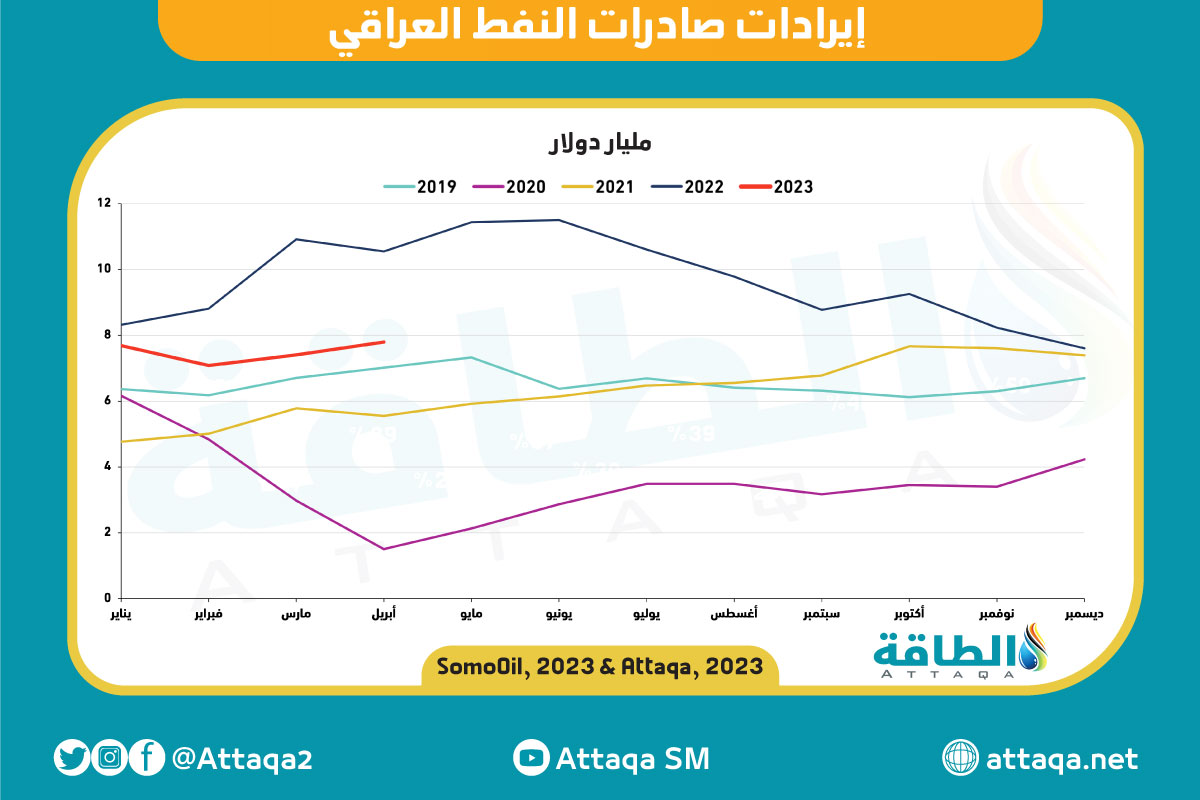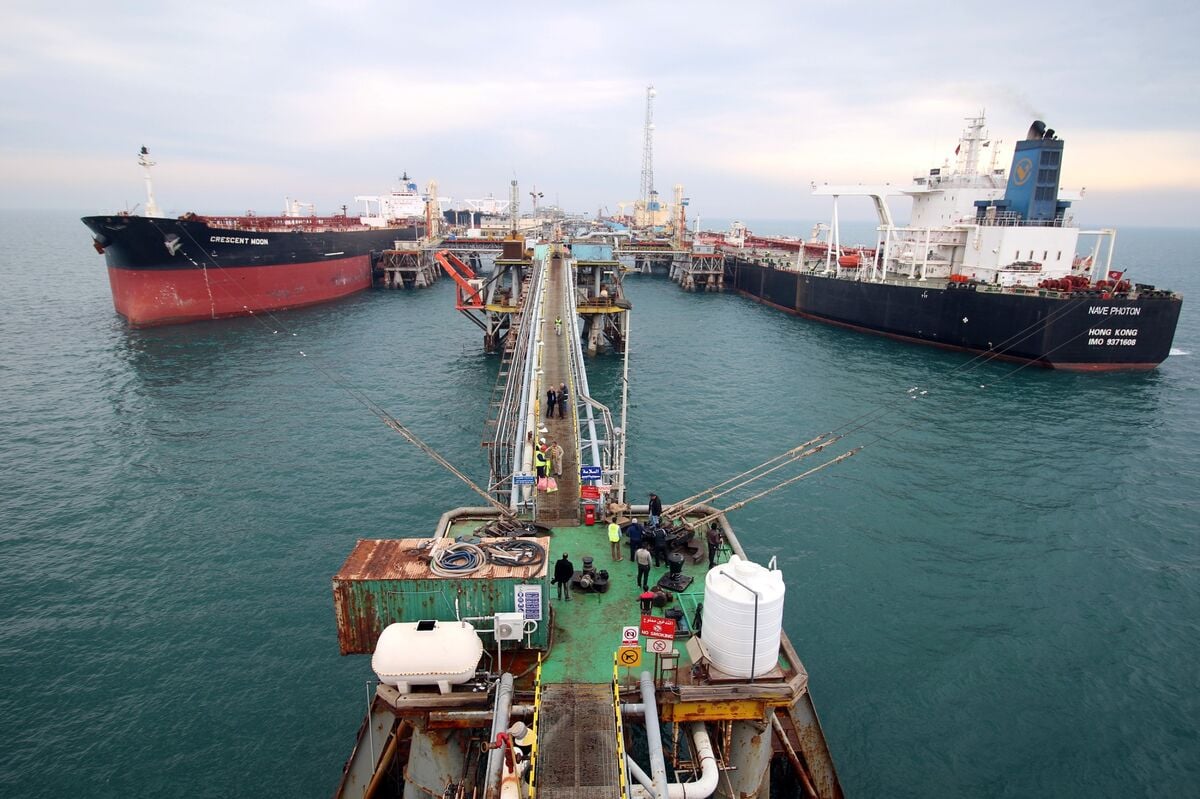Iraqi oil exports in May 2023 are expected to remain close to last month’s levels, given the continued suspension of production in the Kurdistan Region of Iraq and exports via Turkey.
Additional Iraqi oil export capacity from the southern export ports in the Persian Gulf is “limited,” a senior Iraqi oil official told S&P Global Platts.
It also continues to suspend production of more than 450 thousand barrels per day from the Kurdistan region and the government fields exported from the north through Turkey.
As a result, total Iraqi oil exports in May 2023 are unlikely to exceed about 3.3 million barrels per day, with Baghdad unable to boost production, according to information seen by the specialized energy platform.
Iraqi oil production
Data from the Ministry of Oil showed that Iraqi oil exports – excluding flows from the Kurdistan region – rose by 1% on a monthly basis, to 3.288 million barrels per day during April 2023.
And in May 2023, Iraq began voluntarily reducing its production share by 211 thousand barrels per day, to 4.22 million barrels per day, to join 7 other members of the OPEC + alliance that announced on April 2, 2023 voluntary production cuts totaling 1.66 million barrels per day until end of 2023.
The voluntary cuts come on top of the OPEC+ coalition’s collective cut of two million barrels per day, which began in November 2022 and will continue until the end of 2023.
In March 2023, Iraqi oil production grew by 60,000 barrels per day, to 4.39 million barrels per day, according to the latest survey conducted by S&P Global Platts.
Iraqi oil exports through Türkiye
The prime ministers of Baghdad and Erbil had agreed to a temporary deal on April 4, 2023, to resume oil exports through the Turkish port of Ceyhan.
Despite numerous pledges of a speedy restart, no Iraqi crude has been loaded since Ankara halted exports on March 25, 2023, with the decision of the International Court of Arbitration.
Prior to the suspension, more than 450,000 barrels per day of Iraqi oil flowed into Ceyhan, with about 350,000 to 375,000 barrels per day of exports comprising Kurdistan Blend, known as KBT, from the semi-autonomous region’s oil fields, and the 75,000 To the remaining 100 thousand barrels per day, most of which are Kirkuk crude.
On May 3, 2023, Iraqi Oil Minister Hayan Abdul Ghani said that he expected Baghdad and Erbil to complete the agreement within two weeks to resume exporting crude oil through Ceyhan.
To resume exports, Ankara will also need to agree to reopen the Iraq-Turkey pipeline, which was closed as a result of the dispute.
Abdul-Ghani made it clear – in his statements – that Turkey is still examining oil pipelines on its part before resuming oil exports.
Baghdad claims that its right to export all Iraqi oil is supported by the International Court of Arbitration ruling issued by the International Chamber of Commerce on March 23, which stated that exports from the Kurdistan region through the port of Ceyhan were in violation of the 1973 agreement between Iraq and Turkey.
The increase in Iraqi oil exports
In this context, revenues from Iraqi oil exports increased by about $392 million during the month of April 2023, amounting to 3.288 million barrels per day, compared to the quantities exported during the month of March, estimated at 3.255 million barrels per day.
The preliminary statistics – announced by the state oil marketing company “SOMO” – revealed that revenues from Iraqi crude exports during the month of April 2023 recorded about $7.796 billion, compared to March revenues that amounted to $7.404 billion.
The total Iraqi oil exports in April 2023 were about 98.634 million barrels, compared to 100.913 million barrels in March.
It is noteworthy that the federal government seeks to maximize oil export revenues during the current year (2023), by implementing a plan to increase export quantities by about 250,000 barrels of crude oil per day, during the second half of the year, bringing the total quantities to about 3.6 million barrels per day.
The following chart – prepared by the specialized energy platform – shows the evolution of Iraqi oil export revenues since 2019:

Negotiating Iraqi Kurdistan’s oil exports
In the same context, the Iraqi government assigned the State Oil Marketing Company “SOMO” to deal with the exports of Iraqi Kurdistan’s oil, which was sold and exported independently through Turkey before the verdict was issued.
SOMO has not yet signed agreements with companies to sell Iraqi Kurdistan’s oil, and new contracts with existing Kurdish traders are likely to be for only two months, according to what the Iraqi oil official told S&P Global Platts.
The official added that the volumes of oil in the contracts had not yet been determined, but were likely to be “small”.
Meanwhile, international oil companies operating in Kurdistan warn that they may stop investing, with many of them forced to stop pumping due to their inability to export.
And Gulf Keystone said, on April 27, 2023, that it is studying legal measures regarding stopping exports, which forced it to stop its production.
related topics..
Also read..

Leave a Reply